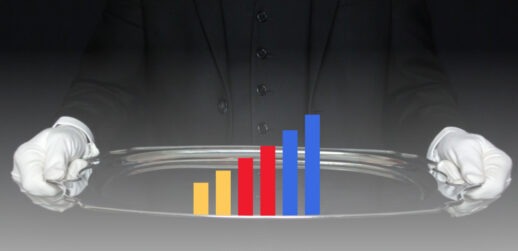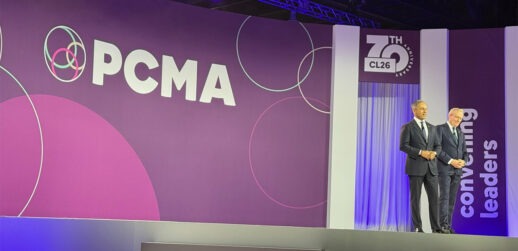When PCMA CEO Sherrif Karamat announced on May 22 that more than 50 senior executives had signed his Ascent CEO Promise to create inclusive workplaces, he had his sights set on scaling even higher heights. “The industry can be a model for the larger world,” he said when discussing the reaction after a week of lobbying leaders globally to make the pledge. “When you consider how many women are in the sector and only 10 percent are in leadership roles, it is an opportunity to show the power of a transformed, more diverse workplace,” he says.
“This started as a discussion about gender equality, focused on women in leadership roles and equal pay,” Karamat explains. He wanted the panel for She Means Business he was moderating at IMEX Frankfurt to be much more than empty words. “It is 2018, and we are beyond talk. We need to do something about this,” he says.
By “this” Karamat means much more than gender inequality. In his view, it is high time that everyone feels welcome to contribute; that includes people of all sexual orientations, minorities and people with abilities (as opposed to disabilities).
“The evidence shows that it just makes good economic business sense to include lots of different perspectives,” he says. A representative from software-maker SAP testified during that IMEX panel that hiring people on the autism spectrum has improved the company’s products. Studies show Fortune 500 companies with female leaders have 41 percent better return on equity compared to companies without female leaders. “It is a moral and business imperative—it checks both boxes,” he says.
The CEOs who signed the pledge committed to making their workplaces more open and trusting, providing education on barriers to inclusivity and sharing what they know—and what needs improvement. Smart Meetings asked a handful of them what specific actions they planned to take to turn their companies into models for a larger world.
Johanne Belanger, president and CEO, Tourism Toronto
“It’s not about just saying a company has a trusting setting, it must authentically be a trusting setting. One of the proudest moments I’ve had as a CEO was when Tourism Toronto was named as one of the top 50 Best Places to Work in Canada this year. A successful work culture needs to be a trusting work culture—but it takes constant work. One of our core values at Tourism Toronto is ‘Let’s Talk’ and that includes being respectful and actively listening. It’s about sharing information, giving credit and acknowledging that mistakes are okay, but we have to learn from them. We celebrate our wins and learn from our mistakes. We’re in this together.
“Empowering people is a passion of mine and has been throughout my career. I was the female CEO in a very male-dominated industry. I know what it’s like to swim upstream. I know what it’s like to feel silenced and to feel like you’re not empowered. Finding your voice is challenging and we have to take on that challenge head-on. We have to ask for opportunities, call out injustice, take a stand and be our authentic selves.”
Cheryl Kilday, president and CEO, Visit Spokane
“We recently completed harassment training with our management team and entire staff. We will continue to demonstrate that we are listening and respond appropriately in a timely fashion. Being heard is the first step.
“I’ve always been a bit of a gatekeeper in that I want to invite people in. Professionally, we work with a wide audience and want to recruit a workforce that can be genuine. Diversity, like travel, leads to understanding and peace.”
Tammy Blount, CEO, See Monterey
“We actually work with the human resources consultancy company FiredUp! Culture to measure exactly this and more. We want to ensure we have our finger on the pulse of our team and that our environment is one of mutual respect—and a safe place to tell the truth. We’ve been working with them for several years now, and it has been a powerful tool for our organization.
“It is critical that all leaders pay attention to the culture within and outside of our organizations—we have an opportunity to influence entire communities and sectors to ensure fair opportunity is available to everyone.”
Mark Cooper, CEO, IACC
“PCMA is right to identify this as a challenge the industry is facing and an opportunity for the hospitality industry to be recognized as a shining light in overcoming bias and creating inclusive workplaces. With the education PCMA is putting on at its conference in June and the webinars planned, I will be working with our staff and volunteer groups in the Americas, Europe and Australia to highlight these learning opportunities and to participate.
“I am fortunate because I get to work with people from all backgrounds, and I have built many lasting relationships. When I start to understand the effects of unconscious bias, I think of it along the lines of “how lucky I am I that this has not been something that has stopped me from working in other countries and cultures—and how would I feel if it had?”
“IACC is a global family, which embraces all minorities. At our conferences and events, it is important that we do not do things which alienate—unintentionally or intentionally.”
In Conclusion, the Measure of Success
Karamat says there isn’t one solution. “We need to try lots of different things, and we need to measure real performance indicators to evaluate what worked and what didn’t.”
Success for Karamat will mean not having this conversation 10 years from now. “We will live in a better, just society,” he says. “The world is a big place, and it will take a while. It is a process, but I am hoping the conversation will have changed by then.”




